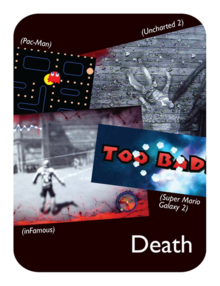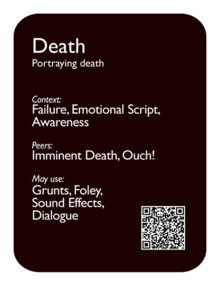Difference between revisions of "Death"
ValterAlves (Talk | contribs) m |
ValterAlves (Talk | contribs) m |
||
| Line 25: | Line 25: | ||
For the design of PC's [[Death]] it is crucial to assess the expected recurrence of dying, according to the gameplay and difficulty level. For instance, [[Variety]] may be required to avoid compromising the emotional intention upon repetition. | For the design of PC's [[Death]] it is crucial to assess the expected recurrence of dying, according to the gameplay and difficulty level. For instance, [[Variety]] may be required to avoid compromising the emotional intention upon repetition. | ||
| − | Conversely, NPC's Death, being a frequent and usually intended event (that is, emotionally positive), | + | Conversely, NPC's [[Death]], being a frequent and usually intended event (that is, emotionally positive), usually consists of simpler stimuli serving essentially as a death certificate ([[Awareness]]). In some games the possible emotional distress related to the idea of death is completely absent and the "termination" of opponents is purely characterized as an [[Achievement]]. |
| examples= | | examples= | ||
Revision as of 11:24, 13 October 2011

|

| |
| The card's front face | The card's back face |
Contents
Synopsis
| Portraying death. |
Relationships
Context:
Failure ![]() , Emotional Script
, Emotional Script ![]() , Awareness
, Awareness ![]() .
.
Peers:
Imminent Death ![]() , Ouch!
, Ouch! ![]() .
.
May use:
Grunts ![]() , Foley
, Foley ![]() , Sound Effects
, Sound Effects ![]() , Dialogue
, Dialogue ![]() .
.
Description
In games where the idea of "live(s)" is part of the gameplay, the condition of the PC's Death represents an extreme condition of Failure, calling for an appropriate level of Awareness.
Moreover, the ("real-life") concept of death holds inherent associations to emotions that may be explored in games, namely with the contribution of sound design, both to enrich the (Emotional Script) and to emphasize the pertinence of avoiding such condition.
In some games the PC's Death is an acoustically complex episode, involving for instance PC's Grunts (Ouch!), NPC's Dialogue (of sympathy or despise), Foley from the action conducing to the death, and some additional Sound Effects.
For the design of PC's Death it is crucial to assess the expected recurrence of dying, according to the gameplay and difficulty level. For instance, Variety may be required to avoid compromising the emotional intention upon repetition.
Conversely, NPC's Death, being a frequent and usually intended event (that is, emotionally positive), usually consists of simpler stimuli serving essentially as a death certificate (Awareness). In some games the possible emotional distress related to the idea of death is completely absent and the "termination" of opponents is purely characterized as an Achievement.
Examples










